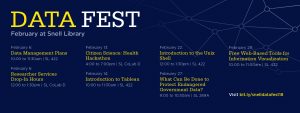At the beginning of this semester, I had the opportunity to meet with several groups of new graduate students in the sciences. I quickly realized that they didn’t easily fall into either of my preconceived categories of “students” or “faculty.” Sure, grad students pay tuition like undergrads, but they often also work as research or teaching assistants, and especially in the sciences they’ll have the chance to gain experience publishing their research in scholarly journals. It’s been a while since I was a grad student myself (and never in the sciences), so I decided to do a little, well, research on the topic.
Quite by coincidence, I found a recently published book in the Hub that any grad student (or faculty member who works with grad students) would find helpful:
⇒
The Art of Being a Scientist: A Guide for Graduate Students and Their Mentors, by Roel Snieder and Ken Larner (Cambridge University Press, 2009)
It’s geared towards grad students and faculty in the sciences, but chapters on time management, the ethics of research, and “turning challenges into opportunities” will be of interest to anyone getting started in the world of research and publishing.
Over the summer I read a book called
Bad Science, by Ben Goldacre — it’s a collection of Goldacre’s columns from
The Guardian newspaper in Great Britain.* He’s a doctor who works for the National Health Service there, and has made quite a name for himself debunking various health claims from drug companies, advertising agencies, etc. It really showed me that skepticism is a good thing. He bases his writing on the concept of evidence-based medicine (also called evidence-based practice), which promotes the use of the scientific method to guide clinical decision-making. Goldacre points out in many of his columns that in fact evidence is sometimes ignored in order to promote a claim that is not supported by, for example, drug trials. He also cited this book as a classic in the field:
⇒
How to Read a Paper: The Basics of Evidence Based Medicine, by Trisha Greenhalgh (BMJ Publishing Group, 1997)
Another book on the topic in our collection is:
⇒
Studying a Study and Testing a Test: How to Read the Medical Evidence, by Richard K. Riegelman (5th ed., Lippincott Williams and Wilkins, 2005).
(Also available as an
e-book!)
I liked the second one for its inclusion of “flaw-catching exercises” designed to make readers think about why a certain statement is not supported by the example evidence. I’m not a scientist, but I still found reading about evidence-based practice really interesting!
As Scholarly Communication Librarian, I meet with a lot of faculty who are active in researching and publishing, but until this semester I had not had the pleasure of meeting many graduate students. At the library, we are especially interested in starting to work with researchers at all levels to support data management needs — you’ll see more about this in the months to come. I look forward to meeting more of you in the future and supporting your research and publishing needs as well!
* We don’t own Bad Science at this library but you can borrow it through NExpress!
 Here’s a taste of what we have planned:
→ Stop by and lend a hand at our Citizen Science: Health Hackathon
→ Make friends with your command line at our Intro to the Unix Shell workshop
→ Learn how to create impressive charts & data visualizations at our workshops on Tableau and free web-based tools
And more!
Here’s a taste of what we have planned:
→ Stop by and lend a hand at our Citizen Science: Health Hackathon
→ Make friends with your command line at our Intro to the Unix Shell workshop
→ Learn how to create impressive charts & data visualizations at our workshops on Tableau and free web-based tools
And more!
 Check out the full lineup and register here: http://bit.ly/snelldatafest18
Check out the full lineup and register here: http://bit.ly/snelldatafest18
 Here’s a taste of what we have planned:
→ Stop by and lend a hand at our Citizen Science: Health Hackathon
→ Make friends with your command line at our Intro to the Unix Shell workshop
→ Learn how to create impressive charts & data visualizations at our workshops on Tableau and free web-based tools
And more!
Here’s a taste of what we have planned:
→ Stop by and lend a hand at our Citizen Science: Health Hackathon
→ Make friends with your command line at our Intro to the Unix Shell workshop
→ Learn how to create impressive charts & data visualizations at our workshops on Tableau and free web-based tools
And more!
 Check out the full lineup and register here: http://bit.ly/snelldatafest18
Check out the full lineup and register here: http://bit.ly/snelldatafest18
